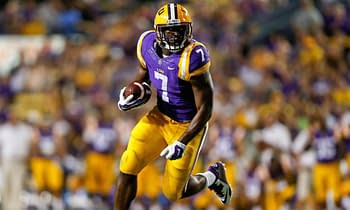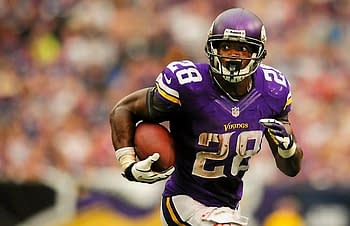Posted in: NFL, Sports | Tagged: Adrian Peterson, entertainment, Leonard Fournette, marshawn lynch, nfl, sports
The High-Risk, Low-Reward Of The Running Back Position

Very few teams have a bell-cow rusher anymore. It's becoming running game by committee with a main guy, a scat back for third downs and a straight-forward rusher for short-yarded situations. Emmitt Smith used to do it all for Dallas Cowboys. Adrian Peterson tried to be that way for the Minnesota Vikings… but you are more likely now to find teams that rotates running backs out so much it's hard for them to get warmed up.
The change comes in part because of the brutal nature of the position and partially because of the Collecting Bargaining agreement. Let's start in college. Very few teams run a true pro-style offense, instead relying heavily on a mobile QB and a high number of rushes. Player having 1,000 to 1,500 yard seasons are more common than rare. And with each carry, there is wear and tear on the body. Each hit, each tackle, every cut back and dive… they all take a toll that is accumulative over the years. Running backs come out of college with more experience and more damage than most other players.

Instead, teams are jumping back into the draft and finding the next set of somewhat fresh legs and only offering mediocre contracts to the veterans. You can see it in the contract that veteran running backs are getting. Jamal Charles, age 30, just signed a one-year deal with the Denver Broncos for $3.75 million. Adrian Peterson, the premiere running back in the NFL for years, just signed a 2-year deal with the New Orleans Saints for an average of $3.5 million a year. Marshawn Lynch at age 31 could make $8.9 million with the Oakland Raiders… but that's an incentive laden contract that is only guaranteed to pay $3 million as long as he makes the team. Fournette hasn't taken a snap in the NFL, yet he's going to make close to double what these veterans will make.
The league now looks at running backs as disposable. A RB that hits the age of 30 is considered on the downhill of his career. Justin Forsett announced his retirement today at the age of 31, commenting on how he was able to stay I the league so long. Tom Brady is 39 and talking about wanting to play five more years. Brady has had almost as long of a career after he turned 31 than Forsett had at all.
Look at the recent draft. 26 running backs were drafted. Only 4 in the first two rounds. A few more got more got picked up after the draft. Christian McCaffrey was drafted in the first round by the Carolina Panthers, a team that just extended the contract of Jonathan Stewart another year. Stewart just turned 30. Stewart used to share a backfield with DeAngelo Williams, who they cut two years ago when he turned 31.
The NFLPA agreed to the Rookie Pay Scale in an effort to free up money for teams to keep veteran players around longer. The NFL agreed to it so they wouldn't have to pay a fortune to unproven players. It seemed like a win-win to everyone… except running backs who get locked into set contracts for the prime of the career, beaten and bruised on play after play and then are considered over-the-hill at the age of 30. A lot has changed in the NFL.









